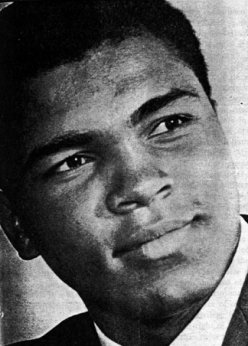Star
Gold Member
- Apr 5, 2009
- 2,532
- 614
- 190
.
but Muhammad Ali's greatest battle was still to be fought...
On August 23, 1966, Muhammad Ali embarked on the biggest "fight" of his life when he applied with the Selective Service for conscientious objector status on religious grounds (as a minister with the Nation of Islam). In what became an extensive legal, political, professional, and personal battle, Ali was convicted of draft evasion, stripped of his boxing title, and became a lightning rod — and a voice — for opinions on the Vietnam War. Muhammad Ali's willingness to speak out against racism in the United States, and the affect it had on domestic and foreign policy, earned him many supporters and detractors. In 1971, nearly five years after it began, Ali's legal battle finally culminated with a unanimous decision (8-0 with Thurgood Marshall abstaining) by the United States Supreme Court overturning his draft conviction. The following resources document his struggle, his views, and his influence.
Clay, aka Ali v. United States 1966-1971
Click here for resources detailing Muhammad Ali's fight against induction into the U.S. Army — from 1966 to 1971. It includes the full text of the Supreme Court decision (Clay, aka Ali v. United States), a 1967 CIA document describing a pro Ali rally, editorials and coverage from the Nation of Islam publication, Muhammad Speaks, and more.
Ali's Vietnam Legacy
Muhammad Ali's stance on Vietnam inspired admiration and hatred among many. Click here to find resources describing Ali's Vietnam legacy, including reactions to his being named "Athlete of the Century" by USA Today in late 1999, an Ali interview with National Public Radio from December 2001, in which Ali answers his critics, and more.

"No, I am not going 10,000 miles to help murder kill and burn other people to simply help continue the domination of white slavemasters over dark people the world over. This is the day and age when such evil injustice must come to an end."
—Muhammad Ali
<snip>
.
but Muhammad Ali's greatest battle was still to be fought...
"I Ain't Got No Quarrel With The VietCong...
No VietCong Ever Called Me ******" — Muhammad Ali, 1966
No VietCong Ever Called Me ******" — Muhammad Ali, 1966
On August 23, 1966, Muhammad Ali embarked on the biggest "fight" of his life when he applied with the Selective Service for conscientious objector status on religious grounds (as a minister with the Nation of Islam). In what became an extensive legal, political, professional, and personal battle, Ali was convicted of draft evasion, stripped of his boxing title, and became a lightning rod — and a voice — for opinions on the Vietnam War. Muhammad Ali's willingness to speak out against racism in the United States, and the affect it had on domestic and foreign policy, earned him many supporters and detractors. In 1971, nearly five years after it began, Ali's legal battle finally culminated with a unanimous decision (8-0 with Thurgood Marshall abstaining) by the United States Supreme Court overturning his draft conviction. The following resources document his struggle, his views, and his influence.
Clay, aka Ali v. United States 1966-1971
Click here for resources detailing Muhammad Ali's fight against induction into the U.S. Army — from 1966 to 1971. It includes the full text of the Supreme Court decision (Clay, aka Ali v. United States), a 1967 CIA document describing a pro Ali rally, editorials and coverage from the Nation of Islam publication, Muhammad Speaks, and more.
Ali's Vietnam Legacy
Muhammad Ali's stance on Vietnam inspired admiration and hatred among many. Click here to find resources describing Ali's Vietnam legacy, including reactions to his being named "Athlete of the Century" by USA Today in late 1999, an Ali interview with National Public Radio from December 2001, in which Ali answers his critics, and more.

"No, I am not going 10,000 miles to help murder kill and burn other people to simply help continue the domination of white slavemasters over dark people the world over. This is the day and age when such evil injustice must come to an end."
—Muhammad Ali
